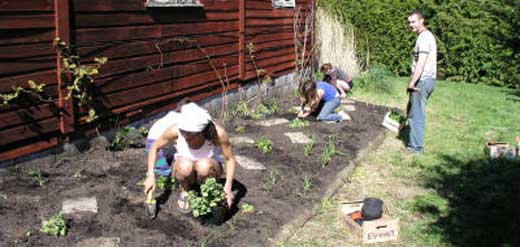Volunteering at "The Field"

There always seems to be more work to do at the land than there are people and time to get it done. Therefore we actively welcome people who want to come and stay for a while with us as volunteers.
Volunteering is an excellent way to get to know more about Plants for a Future and the plants we grow here. Apart from the work that needs to be done (more about that later), volunteers are given a comprehensive tour of the land with information about the plants growing there and a taste of some of the edible plants that are in season at the time. You will also be shown how to make your own salads from the various perennial salad plants we grow.
Working as a volunteer here also gives you a unique chance to be really close to nature for a while. The land is like a little world of its own. Surrounded by barren farmers' fields, it is a lush, sheltered, tree-covered landscape that is an absolute paradise for the wildlife and the people who work there. It is hard to imagine that, when we first bought the land in 1989, it was a huge, wind-blasted, prairie-like eroded field, devoid of much wildlife, where even the nettles were poor. Now it is full of life! The top half is planted out with native trees and shrubs and has become a young woodland. There are arboreta and other areas with experimental trees and shrubs of edible fruits and nuts - as well as beds of perennial herbaceous plants and a more conventional orchard plus a few conventional vegetables.
The only disadvantage of this increased fertility is that the weeds, mainly grasses and brambles, tend to grow very rampantly as well, so it is more work to keep them in check in the more managed areas! Hence the need for more help! It is not only weeding, of course, as a volunteer you will also help with a multitude of tasks all of which will help you to develop your gardening and plant skills.
You can really enjoy being close to nature here, where you can wake up in the morning to the singing of birds and, with luck see a fox or a barn owl come wandering past before you even have breakfast! Facilities are rather primitive- volunteers normally camp - or stay in a rather battered caravan on site. Unfortunately, there is no planning permission here and so no-one actually lives on the land - thought we are allowed 28 days per year camping. (it is hoped that we will obtain planning permission in the future, see this article). We live in a nearby village.
There is water on tap, cooking facilities and a compost toilet, but no warm water showers, no electricity and no flush toilet.
You will also need to be self-catering in food. Cooking facilities are available and there is usually salad stuff and fruit available from the land. Basic food stuff such as oats, rice, lentils etc are provided. However, if you want anything fancy, you may need to bring it yourself .
Visitors are requested not to bring any meat or fish on site and not to smoke in indoor spaces.
So, whether you want to come for a day, a week, a month, or anywhere in between, please contact us to arrange a mutually convenient time. Please do not just turn up as we cannot guarantee that there will be anyone there!
If you are interested in volunteering, please phone 01208 873554 (you will often have to leave a message);
write to Plants for a Future at The Field, Penpol, Lostwithiel, Cornwall, PL22 0NG.
Or email [email protected]
You will get a much faster response from phoning.
We are looking for people who are interested in being involved here on a longer term basis, possibly those with interest to re-awaken such ventures as :
- reawaken the sleeping plant sales nursery
- develop the land as an Education Centre with short courses on useful plants , ecological gardening, nutrition, vegan growing.
If you are interested in any of this, then please contact Addy Fern, The Field, Penpol, Lostwithiel, Cornwall. PL22 0NG.
Planning permission to live on the site.
Because of the remoteness of this site, many potential developments on the site are hampered by the distance required to travel to the site.
Re-application for planning permission may be considered in the future.
Visiting The Field - Tours and Open Days
Please see this page for more information.